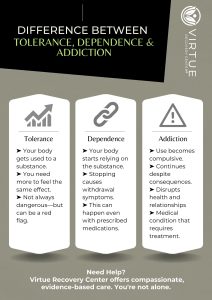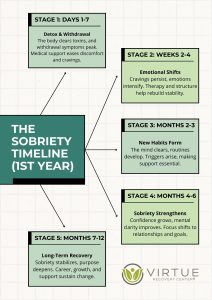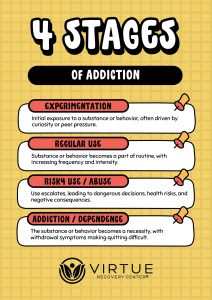An outpatient treatment program provides essential support for those struggling with substance use disorders. Typically, these programs are intended to help individuals work toward recovery while continuing to live in their homes and stay engaged in everyday activities. While the goal of outpatient treatment is to help patients achieve long-term sobriety, they must also learn strategies for managing and coping with their daily struggles.
If you’re wondering what are outpatient treatment programs and if they are right for you, contact 866.520.2861 to learn about Virtue Recovery Las Vegas programs.
What Are Outpatient Treatment Programs?
Outpatient treatment programs are designed to provide individuals with substance use disorders the structure and support they need while allowing them to remain at home. While outpatient treatment does not require an individual to stay in a residential facility, it involves regularly attending therapy sessions. These sessions may include individual counseling, group therapy, or both. In addition, these programs often include medication management to help manage symptoms and support the recovery process.
Outpatient treatment includes relapse prevention, life skills development, educational classes, vocational training, and family therapy. All of these components are designed to provide an individual with the tools they need to manage their substance use disorder so that they can find long-term sobriety.
The length of outpatient treatment can vary depending on the individual’s needs and progress. Most programs involve meeting with a therapist at least once weekly for several months or longer. As an individual makes progress, they may be able to reduce the frequency of their sessions or move to a less intensive program.
Is Outpatient Treatment Right for Me?
The decision to seek treatment for a substance use disorder is important. It can be overwhelming to determine the right course of action, and it’s essential to have access to knowledgeable professionals who can help make the best decision for each individual’s situation. If you are considering whether outpatient treatment is proper for you, some signs that it could be the right program for you include:
- You need more structure and support than self-help programs provide.
- You have a mild to moderate substance use disorder and don’t require 24/7 care.
- You want to remain in your home environment while receiving treatment.
- You have access to reliable transportation for attending regular sessions.
- You are committed to committing the time, energy, and resources necessary for recovery.
Outpatient programs can also be a step down from more intensive treatment like residential treatment, providing individuals with the support they need after completing a more intensive program.
What to Expect at an Outpatient Treatment Program
At an outpatient treatment program like Virtue Recovery Las Vegas, you can expect to receive individualized care from experienced and compassionate professionals. All programs at Virtue Recovery provide evidence-based treatments such as cognitive behavioral therapy, motivational interviewing, and dialectical behavior therapy.
You will also be encouraged to attend sober support groups such as Alcoholics Anonymous or Narcotics Anonymous. This provides invaluable peer-to-peer support and accountability that can be integral to long-term recovery. In addition, you may be referred to other resources, such as residential treatment programs or sober living homes, when the need arises.
You can expect to work with professionals invested in your health and well-being at an outpatient treatment program. There are also a variety of services available to help you address any underlying issues such as anxiety, depression, or trauma that can be contributing factors to substance use disorder.
How Does Suboxone Treatment Fit into an Outpatient Treatment Program?
Suboxone treatment lasts can fit into an outpatient treatment program by providing individuals with a medication-assisted approach to managing opioid dependence. This allows for flexibility in attending therapy sessions and receiving support while still being able to continue daily activities. It offers a comprehensive approach to recovery.
Contact Virtue Recovery Las Vegas for Outpatient Treatment
If you are ready to take the next step in your journey toward recovery, reach out to 866.520.2861 for help. The knowledgeable team at Virtue Recovery Las Vegas can provide you with the information and resources needed to make an informed decision about your care.













